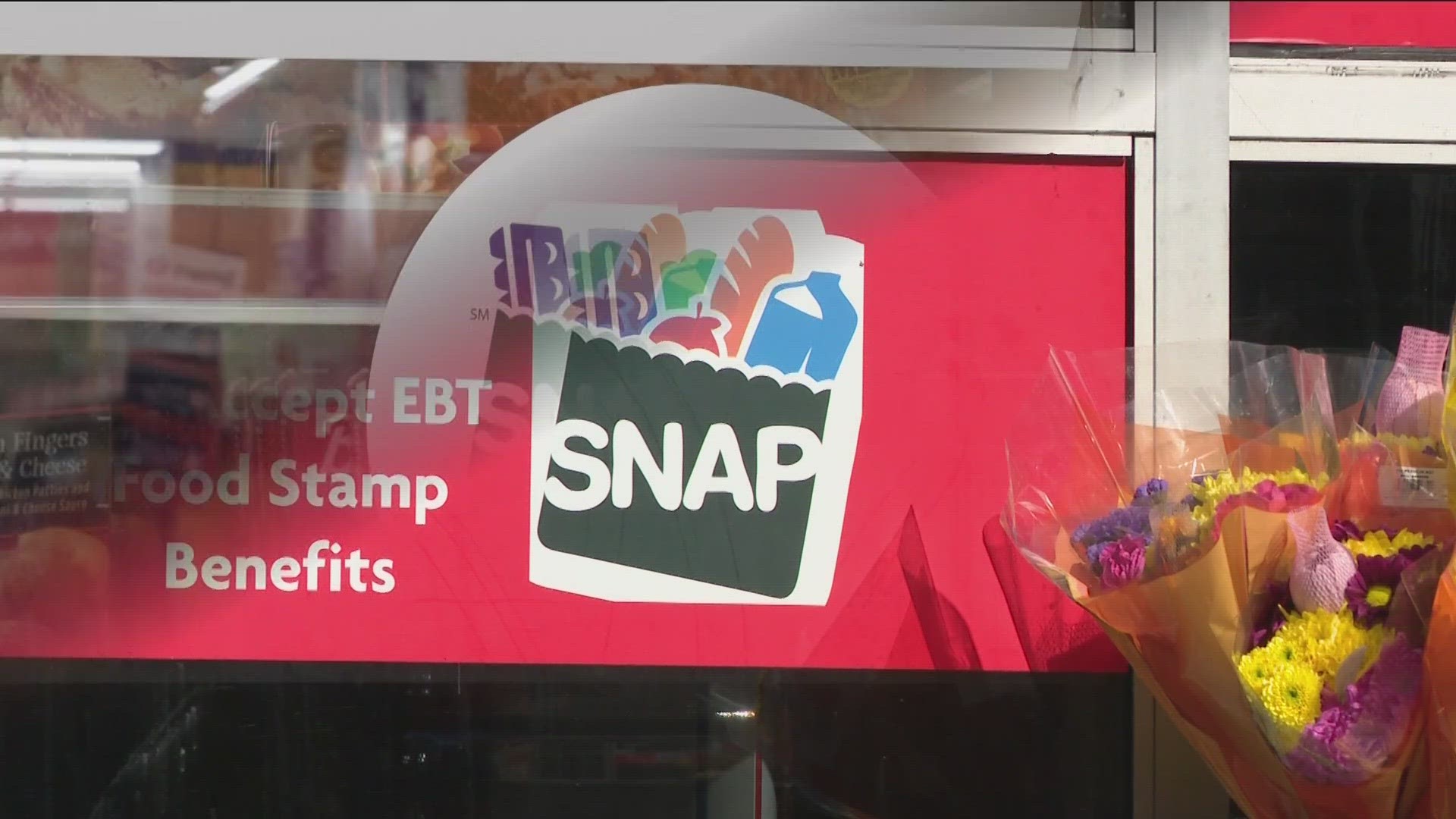ATLANTA — Christmas is six days away as tens of thousands of Georgians across the state wonder how they'll be able to feed their families this month.
Now, the federal government is escalating the situation as the Georgia Department of Human Services continues to grapple with a backlog of SNAP cases. The department has been missing federal deadlines when it comes to issuing monthly benefits on time, and many families are stuck with no answers as to when their cases will be processed
The issue was detailed in a November 21 letter from the USDA Food and Nutrition Service to Georgia Department of Human Services Commissioner Candice Broce, where federal regulators reveal the state is "severely out of compliance with Federal requirements" related to processing new applications on time.
Federal law requires benefits be issued to eligible recipients within 30 days of an application for standard cases, and within seven days for expedited cases. The process of approving applications is one of the most fundamental parts of the assistance program, Georgetown Law professor David Super told 11Alive.
"The USDA's letter points out that this is not a sudden blip, but that prior data showed that Georgia has an ongoing problem with not getting food to people who need it," Super said. "It indicates to me a lack of confidence in Georgia's administration and indicates that the USDA is seeing these problems recur, has raised them a number of times, has seen partial patches here and there."
As a result, federal regulators are now requiring Georgia submit a corrective action plan within 30 days to address the root causes of the problem and find ways to improve processing times, including timelines for completion.
Monitoring states' APT (application processing timeliness) rates is part of the USDA's oversight procedures. Regulators consider an APT rate of 95 percent and above acceptable performance, while those states with a history of timeliness issues must submit and adhere to a correction plan.
Georgia's rate, the letter states, has been "concerning for some time," with the state "severely out of compliance with Federal requirements." From January 2023 - June 2023, the state's APT rate, as detailed in the letter, was 84.90%. More recent data requested by 11Alive through open records requests show the state's APT rate has continued to drop since that time, hitting a 6-month low in October at 72.31% (the latest month for which data is available).
"They're trying to fix the problem, not punish anybody," Super said of the USDA's request. "They say that they're hoping that corrective action will work, but that if it doesn't, they can move on to sterner measures. One of those is called advance notification, which tells Georgia you're at risk of losing federal funding and gives them a deadline to turn things around."
In the meantime, the USDA's letter points to the impact: "a hardship to needy households across Georgia."
"I've heard people had pasta for Thanksgiving, and they still haven't received their SNAP benefits," Ife Finch Floyd, Director of Economic Justice for the nonprofit Georgia Budget and Policy Institute, told 11Alive. "And we're coming up on another holiday where they still might not have enough to eat."
Finch Floyd said SNAP is critical support not only for families with low wages, but their children as well as the elderly and those living with disabilities.
As of Dec. 14, the state also continues to deal with delayed renewals, 32,289 of which are overdue, per data provided by DHS.
"We recognize state agencies have faced unprecedented challenges in the past few years with the COVID pandemic and its aftermath," a USDA statement on the backlog said in part. "However, providing timely, accurate SNAP benefits to eligible families in need is a state’s fundamental and legal responsibility. Long backlogs in processing SNAP applications are wholly unacceptable, and families should not go hungry as a result. FNS will continue to work collaboratively with states to improve their processing timeliness and hold them accountable for fulfilling this obligation."
Separately, the GBPI has previously advocated for more support for caseworkers -- those on the frontlines processing benefits like SNAP, Medicaid and TANF. Finch Floyd notes there have been improvements when it comes to the state's attention to this group of workers. On Monday, Gov. Brian Kemp also announced a one-time $1,000 retention bonus for state employees, which includes caseworkers.
"The announced pay raise is a start to help directly support retention efforts of DFCS caseworkers who face extremely high workloads and, like other Georgians, a high cost of living," Finch Floyd shared. "Importantly, this is a sign of recognition to the workers who help ensure individuals and families get the support they need during hard times. The state also has a once-in-a-generation opportunity to go beyond meaningful but incremental short-term investments."
"In addition to the announced bonus, the state can leverage its historic surplus to boost the salaries of DFCS caseworkers, who have historically been among the lowest paid state workers and have had high turnover. Georgia has made good progress in hiring more DFCS caseworkers this year. It should continue its efforts to not only hire more staff, especially those trained to process SNAP cases, but also to retain staff. Higher salaries is a key strategy to meet those goals."
11Alive now has a running list of resources for families experiencing SNAP disruptions. Viewers who want to speak with a reporter about the delays can email the newsroom.

